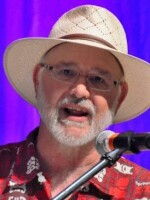Making A Difference; Stories of Hope and Help, is produced for KSMU by Mike Smith, with support from the Community Foundation of the Ozarks.
Today, longtime friends Arthur Mallory and Gary Funk talk about their passionate advocacy for public education and rural schools. Arthur Mallory served as President of Missouri State University from 1964-1971, and as Missouri’s Commissioner of Education from 1971-1987. Gary Funk is a former educator, school principal, and was President of the Community Foundation of the Ozarks from 2003-2010. We pick up the conversation as Arthur Mallory remembers his dad Dillard becoming Superintendent of Dallas County Missouri Schools:
Arthur Mallory: “When we drove into Buffalo in August 1944, there was one stoplight on the highway, on highway 65, and one light on the water tower. Those were the lights in town. We moved from the metropolis of Verona Missouri Where my dad was Superintendent of school for 10 years. It was a little bitty town.”
Gary Funk. “You Know Arthur, I don’t know of any person that’s had the breadth of experiences in public education that you have. From college president to Commissioner, I mean as you reflect back on that it’s quite a journey.”
Arthur Mallory: “It is, and my mother and dad were teachers in one room schools. Mother had a 10th grade education when she started teaching; daddy had an 8th grade education. He passed the county examination when he was in the 7th grade, both of them did. But if you made a sufficiently high enough score you could teach in a one room school if you had an 8th grade diploma.”
Gary Funk: “Something you said to me once impacted me more than anything else. You said one of the most unfortunate things that happened over the course of American educational history is we stopped asking older kids to take responsibility for the younger kids.”
AM: “Yes that’s true. When my dad started teaching 72 kids in a one room school he was 16 and there were several people in the class who were older than he. He never had a course on how to teach, but he did have the State Superintendent’s Course of Study, which gave all of those one room school teachers a direction. You know Cross Age Tutoring; they had that in one room rural schools. The Open Classroom; we had that in one room rural schools. The 3rd graders were listening when the teacher was talking to the 5th graders, and the 3rd graders could help the 1st graders. In those one room rural schools where the older students would participate in the teaching as well as the learning, they thrived. And learning took place, and learning was focused. Now I’m not advocating a return to The Good Old Days, but I would advocate that young people, teenagers, to really be responsible for something.”
GF: “The Community Foundation of the Ozarks, our board, our staff, our donors, we’re really taking those lessons Arthur, in creating the Rural Schools Partnership. To me, what the Rural Schools Partnership does, in conjunction with the CFO, and what we’re trying to do with the multi state Rural Schools Collaborative, is break down those barriers and have communities where elders are engaged with young people. Have communities where non-profits and organizations are a major part of what goes on in a school district. Trying to put young persons in leadership positions like with the CFO Youth Empowerment Project. A process and a plan I think has done some real good. It’s built communities and schools simultaneously.”
AM: “It’s fiction to believe all education takes place in the schoolhouse. Public Education in Missouri has the kids 6 hours a day 5days a week, 170 plus days a year for 13 years. So most of the time for the high school graduate, learning has been out of the classroom in the community or in the home, and that’s part of what the (Rural Schools) Collaborative is trying to push.”
GF: “The notion that public education stands for something, and the notion of civic ownership of the schools was essential to American Development.”
AM: I was walking out of a meeting when I was Commissioner of Education and a TV news crew came up to me and ask for a 30 second sound bite describing the perfect educational program, and I said sure. First of all you have to have access. That’s the tax payer’s responsibility: A bus ride, a good teacher, and books. Access. Number 2, you have to have a supportive home. Parents who get their kids to bed at night having studied their lessons if they have homework; getting a good breakfast in the morning ready to go to school, with a lot of comments about how important school is. That’s a supportive home. But nothing happens unless you have a willing learner, and you create that willing learner so early they can’t remember. If you have access, a supportive home and a willing learner, you can have a good school anywhere.”
GF: “And that’s the thing I think I’m most proud of. The fact that experiences and leadership from folks like you Arthur have come together with the CFO to create something that all across this region is strengthening those bonds between school and community, so I thank you for what you’ve done for me over the years, and what you’ve done for the State, the nation and the region. It’s been consequential.”
AM “How nice of you, Gary.”
For more information on the Community Foundation of the Ozarks, the Rural Schools Partnership, and the Rural Schools Collaborative; http://www.cfozarks.org and http://www.ruralschoolscollaborative.org
For Making a Difference; Stories of Hope and Help, I’m Mike Smith












